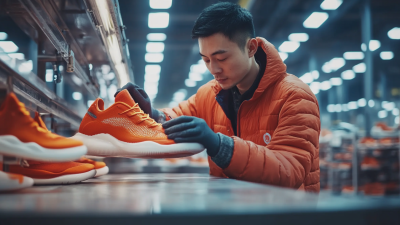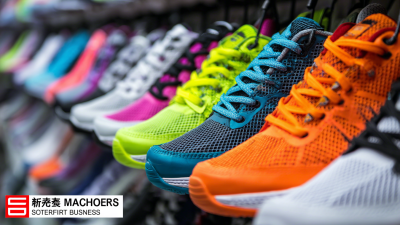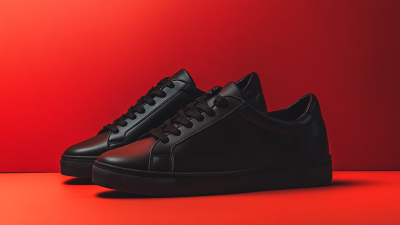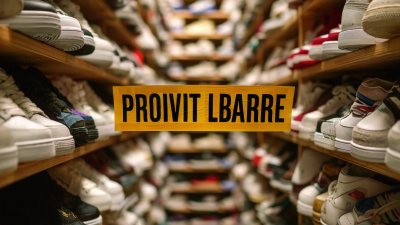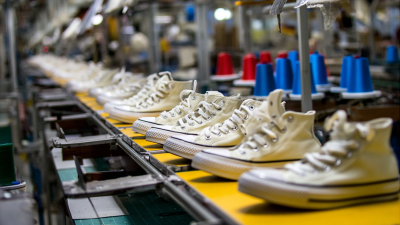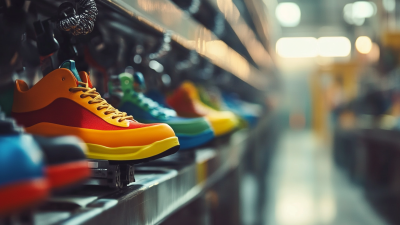
When venturing into the world of customized sports footwear, understanding the ins and outs of a Korea Custom Sports Shoes Factory becomes crucial for success. According to recent reports by Allied Market Research, the global sports footwear market was valued at approximately $64.3 billion in 2020 and is projected to reach $102.8 billion by 2028, growing at a CAGR of 6.2%. This growth is driven significantly by the rising demand for personalized athletic gear that enhances performance and style.

As manufacturers in Korea become increasingly adept at blending cutting-edge technology with innovative design, selecting the right factory can make all the difference in meeting consumer expectations and staying ahead in a competitive market. This ultimate guide will provide you with a comprehensive checklist to navigate your selection process, ensuring that your partnership with a Korea Custom Sports Shoes Factory is both productive and rewarding.
When searching for a custom sports shoe factory in Korea, it's essential to focus on several key features that can elevate your product's quality and brand potential. First and foremost, the factory's manufacturing capabilities should align with your specific design requirements. Look for facilities equipped with advanced technology and skilled labor that can produce innovative designs while ensuring exceptional comfort and performance. This adaptability is crucial for creating unique products that stand out in a competitive marketplace.
 Another important aspect to consider is the factory's quality control processes. A reliable factory will implement rigorous quality assurance measures to maintain high production standards. This includes regular inspections and testing throughout the manufacturing stages to ensure that each shoe meets the specified requirements. Additionally, you should evaluate the factory's experience in handling custom orders, as a partner with a proven track record will be better equipped to manage the complexities involved in custom design and production. By prioritizing these features, you can set the foundation for successful collaboration with a Korean sports shoe manufacturer.
Another important aspect to consider is the factory's quality control processes. A reliable factory will implement rigorous quality assurance measures to maintain high production standards. This includes regular inspections and testing throughout the manufacturing stages to ensure that each shoe meets the specified requirements. Additionally, you should evaluate the factory's experience in handling custom orders, as a partner with a proven track record will be better equipped to manage the complexities involved in custom design and production. By prioritizing these features, you can set the foundation for successful collaboration with a Korean sports shoe manufacturer.
When it comes to producing custom sports shoes, ensuring quality throughout the manufacturing process is paramount. One of the essential quality control measures is the implementation of a comprehensive material inspection.
Before production begins, it’s crucial to assess the quality of all materials, from the upper fabric to the sole components. This preemptive step helps in identifying defects early, thus preventing costly errors during assembly.
Another vital quality control measure is conducting in-line inspections throughout the production process. By monitoring each stage, including cutting, stitching, and assembly, manufacturers can catch any discrepancies in real-time.
These inspections not only help maintain consistency but also reduce rework and waste, ultimately ensuring that every pair of shoes meets the desired standards.
Lastly, a robust final inspection before shipping is essential. This step should involve a thorough examination of the finished products to check for any defects, including stitching issues, sizing accuracy, and aesthetic flaws. Having a dedicated quality control team for this final check ensures that only the highest quality footwear reaches customers, enhancing brand reputation and customer satisfaction in the competitive sports shoe market.
When considering the production of custom sports shoes, Korea stands out for several compelling reasons. First, the nation has earned a reputation for high-quality manufacturing, particularly in the footwear sector. According to a report from MarketLine, the global sports footwear market is projected to reach $128.5 billion by 2023, with a significant portion of this growth attributed to innovations in materials and manufacturing techniques, areas where Korean factories excel. With advanced technology and meticulous craftsmanship, Korean manufacturers consistently produce durable and stylish footwear that meets international standards.
Additionally, Korea's strategic geographic location offers logistical advantages for international shipping. As reported by the Korea International Trade Association, the country's extensive port infrastructure reduces shipping times and costs, making it more competitive to export products globally. Moreover, Korean factories often adopt lean manufacturing practices, minimizing waste and enhancing efficiency, which not only aligns with sustainable practices but also leads to cost savings that can be passed on to clients. These factors combined make Korea an ideal choice for brands looking to invest in custom sports shoe manufacturing while ensuring quality and efficiency.
When selecting the right custom sports shoes factory, it’s essential to consider several crucial steps that will ensure you partner with a reliable manufacturer. First, assess the factory’s experience and expertise in producing custom sports footwear. A factory with a solid track record will likely better understand your requirements and provide higher-quality products. Look for testimonials or case studies from previous clients to gauge their capabilities and reputation in the market.

Next, evaluate the technology and manufacturing processes the factory uses. The integration of AI in the footwear industry is transforming design and production, allowing for innovative solutions that enhance comfort, performance, and customization. A factory that embraces advanced technologies can deliver more precise and efficient manufacturing outcomes, ensuring that your custom sports shoes meet your specific needs.
Finally, consider the factory's commitment to sustainability and ethical practices. Consumers today are increasingly concerned about the environmental impact of their footwear. Choose a manufacturer that prioritizes sustainable materials and adheres to ethical labor practices. This not only enhances your brand’s image but also contributes to a more responsible industry. By following these steps, you can confidently choose a factory that aligns with your vision for custom sports shoes.
Sustainability practices play a critical role in the sports shoe production process, particularly as consumer awareness of environmental issues continues to rise. According to a report from the Global Footwear Market, over 60% of consumers now prioritize sustainable brands when making purchasing decisions. This shift in consumer behavior is prompting manufacturers to adopt eco-friendly materials and production methods. For instance, brands can reduce their carbon footprint significantly by utilizing recycled materials, with statistics showing that using recycled polyester can cut energy consumption by up to 79% compared to virgin polyester.
Moreover, sustainable practices not only benefit the environment but also enhance brand reputation and market competitiveness. The 2022 Sustainable Footwear Report highlights that companies incorporating sustainability into their core business strategies can experience up to a 15% increase in sales. Additionally, transparency in the supply chain has become essential, with consumers demanding clear insights into how their footwear is produced. By implementing ethical labor practices and minimizing resource waste, sports shoe manufacturers can build a loyal customer base, aligning their production with the growing demand for accountability and sustainability in the industry.
